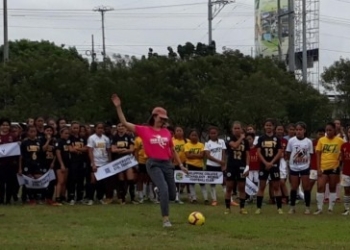Former House Speaker Alan Peter Cayetano on Friday called on the public to sustain bayanihan efforts to help struggling small businesses recover from the pandemic by directing their donations to faith-based organizations that have existing outreach programs.
“Idiretso na po natin sa kanila, para kahit panahon ng kampanya ay tuloy-tuloy ito at hindi nanggagaling ang effort po sa isang kandidato,” Cayetano said as he appealed to donors to help de-politicize aid amid the pandemic.
(Let’s direct the donations to faith-based organizations so that even during the campaign, we can still help people and it doesn’t come from the efforts of any candidate.)
“Doon po sa mga gustong mag-continue ng programang ito, lalo na po sa mga donors na payag kayo sa inyong mga lugar, kung may mga NGO dyan o may pari o pastor o imam na mahilig sa mga outreaches, may ministry talaga sa pagtulong, sa kanila na po natin ibigay,” he added, in reference to the Sari-saring Pag-asa cash aid program for small businesses.
(To those who want to continue Sari-saring Pag-asa, especially to donors who are willing to sponsor NGOs and religious people who have outreach programs, with existing ministries for relief, let’s donate to them instead.)
Cayetano made the call on a live video posted on his Facebook page before the November 26, 2021 episode of Sari-saring Pag-asa Season 2 went online.
A total of 162 sari-sari store owners from San Juan and Quezon City in Metro Manila received P3,500 each during Friday’s episode, bringing the total number of beneficiaries nationwide to 6,847.
More stories of hope
Sari-saring Pag-asa Season 2 is expected to feature more stories from the communities as the program seeks to reach other small businesses aside from sari-sari stores.
Four microentrepreneurs from Barangay Pasadeña in the city of San Juan were featured in the Friday episode, including sari-sari store owners Margie Bautista and Rhoan Ramirez, as well as street food vendor Anna Betsaida.
The women talked to program host Chiqui Reyes about the challenges they faced amid the pandemic and how they would benefit from the P3,500 cash grant they would get from Sari-saring Pag-asa.
One of the featured microentrepreneurs, sari-sari store owner Maria Bonita Baldano, shared that the dip in sales caused by the economic impact of the pandemic on her working-class neighborhood have made it a struggle for her to catch up with her monthly bills.
This was complicated by her husband’s losing his job as a construction worker at the onset of the pandemic.
“Y’ung kuryente, tubig po, naipon kaya ang laki ng babayaran namin. Ayan ang pinorpoblema namin ngayon,” Baldano said.
(Our power and water bills have piled up, that’s why we have a lot that we have yet to pay for. That’s the problem we’re facing right now.)
She said the P3,500 cash grant she received from Sari-saring Pag-asa will help with her delayed bill payments and to restock on fast-moving items in her store.
Success story
The Friday episode also featured the story of 38-year-old mother of two Analiza Gabatbat, who operates a sari-sari store in Camarin, Caloocan City and who became a Sari-saring Pag-asa beneficiary on September 28.
Gabatbat’s corner store saw a 50 percent drop in sales as a direct consequence of the pandemic, resulting in her weekly income falling from an average of more than P2,000 to barely P1,000 amid multiple lockdowns in the past year and half.
When Gabatbat received the P3,500 cash grant from Sari-saring Pag-asa, she immediately used the money to restock her store, buying eggs and canned goods that sell quickly among her customers.
Two months later, she is back to earning P2,000 per week through her sari-sari store, and she has even been able to purchase a microwave oven for her family.
“Ang akin pong munting tindahan kahit papaano po ay nadagdagan dahil sa puhunan na binigay po sa ‘kin,” Gabatbat said.
(The cash aid I received helped in adding more stocks to my small store.)






